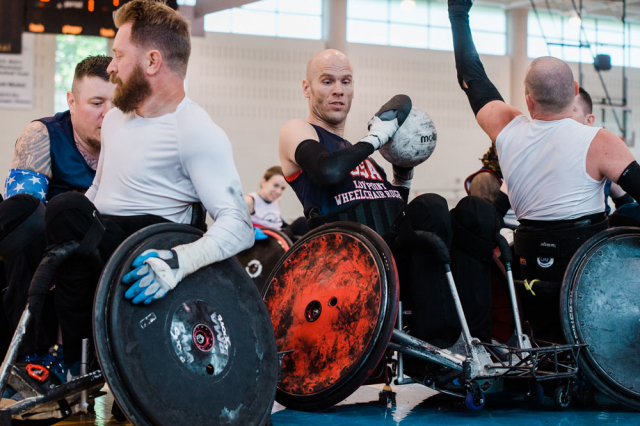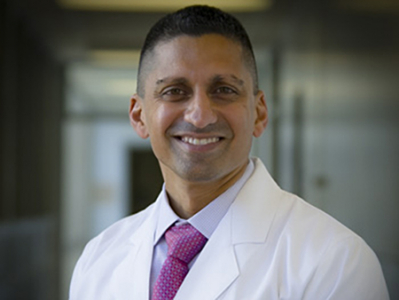 Low point wheelchair rugby is coming to The World Games in Birmingham. (Photo by Lexi Coon)
Low point wheelchair rugby is coming to The World Games in Birmingham. (Photo by Lexi Coon)
As The World Games get underway in Birmingham on July 7, UAB Sports and Exercise Medicine providers are slated to care for, among many others, athletes competing in the wheelchair rugby tournament.
It will not be UAB’s first contact with the sport. Irfan Asif, M.D., chair of the Department of Family and Community Medicine, associate dean for primary care and rural health, and a medical director for UAB’s partnership with The World Games, also serves as the team physician for USA Wheelchair Rugby, which practices at the Lakeshore Foundation in Birmingham. That team, currently ranked No. 3 globally, won silver in the Tokyo 2020 Paralympic Games and will compete in the 2022 World Championships in Denmark.
Jim Murdock, certified athletic trainer and medical coordinator for the USA Wheelchair Rugby team, said Asif and UAB have been “phenomenal partners” for Team USA.
“This is my 44th year as an athletic trainer. I have had to deal and interact with lots of different medical professionals. Dr. Asif and the UAB group are by far the best,” Murdock said. “We feel blessed and kind of spoiled, because we get phenomenal care.”
Asif is on call to consult with Murdock and Team USA for any medical needs and works with athletes when they visit Birmingham for camps and training sessions. He helped the team develop it’s COVID-19 protocols – Murdock notes the team has not yet had a positive COVID-19 test while in Birmingham – and get the vaccinations necessary to compete in Tokyo and other global competitions. Before the last Paralympic Games, for example, Asif and UAB Highlands Family Medicine Nurse Manager Felicia Boyd, R.N., hustled to vaccinate athletes in a one-day clinic after a rapidly spreading strain of influenza in South American prompted the United States Olympica and Paralympic Committee to require additional vaccines for those traveling to Tokyo.
 Irfan Asif, M.D. (Photo by Keith Bailey)
Irfan Asif, M.D. (Photo by Keith Bailey)
“There are only a few paralympic teams that have access to physicians full-time,” Murdock said. “Whenever we are in Birmingham, if anything happens, our men and women get treated immediately, with very little wait time, and that all comes back to Dr. Asif and his staff... We just feel really fortunate to have a staff of this caliber on our team.”
Asif said that he enjoys caring for the inspiring athletes on the wheelchair rugby team and that he is grateful for a "fantastic” partnership with the Lakeshore Foundation.
“I believe that Lakeshore and UAB can really become a hub for Olympic and Paralympic training,” he said.
The World Games offers another opportunity to grow in that mission. UAB is a Foundation Partner and official medical provider of The World Games, which will bring thousands of athletes in 30-plus sports to Birmingham. UAB Sports and Exercise Medicine will be caring for many of them, ranging from lacrosse and squash to canoe water polo and wheelchair rugby teams.
Among the UAB providers overseeing medical needs for The World Games wheelchair rugby team are Calvin Spellmon, M.D., Ashley Williamson, LAT, ATC, William Tremlett, D.O., Matt Miesch, M.D., Peter Rippey, M.D., Christian Muller, D.O., Lendrum Morrow, M.D., Danielle Powell, M.D., Rachel Vines, PA, Brett Bentley, M.D., Beau Grantier, M.D., Jacob Schultz, M.D., and Sheila Ramos, ATC.
The World Games focuses on low-point wheelchair rugby, a slightly different style designed for players with less mobility in their arms. The athletes competing in The World Games do not overlap with members of Team USA, though Murdock said that the games will be an excellent opportunity for players who are working their way on to the national team.
Medically, however, there are similarities and The World Games offer another opportunity for UAB Sports and Exercise Medicine providers to utilize their expertise in caring for athletes with disabilities. Athletes who use wheelchairs, for example, can face increased risk of infection as well as concerns about the fit and function of the wheelchair, especially in high-intensity sports like wheelchair rugby.
"No two patients are the same, in our case all of them have spinal cord injuries with unique complexities and differences from able-bodied athletes’ systems,” Murdock said.
Asif agreed. “Sometimes athletes with disabilities can be overlooked, or do not have access to the same resources, but it is critically important that they get the right care,” he said. “The wheelchair rugby athletes I have worked with are some of the hardest working people I have ever met, and I am honored to be part of their care team.”